

Online Etymology Dictionary. Fabled (adj.) c.1600, "unreal, invented," past participle adjective from fable (v.)
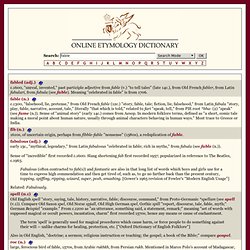
Online Etymology Dictionary. Legend (n.) early 14c., "narrative dealing with a happening or an event," from Old French legende (12c., Modern French légende) and directly from Medieval Latin legenda "legend, story," literally "(things) to be read," on certain days in church, etc., from Latin legendus, neuter plural gerundive of legere "to read, gather, select" (see lecture (n.)).
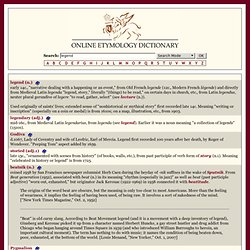
Used originally of saints' lives; extended sense of "nonhistorical or mythical story" first recorded late 14c. Meaning "writing or inscription" (especially on a coin or medal) is from 1610s; on a map, illustration, etc., from 1903. legendary (adj.) mid-16c., from Medieval Latin legendarius, from legenda (see legend). Godiva d.1067, Lady of Coventry and wife of Leofric, Earl of Mercia. Storied (adj.1) Online Etymology Dictionary. Mid-14c., "legendary lizard-like creature that can live in fire," from Old French salamandre "legendary fiery beast," also "cricket" (12c.), from Latin salamandra, from Greek salamandra, probably of eastern origin.
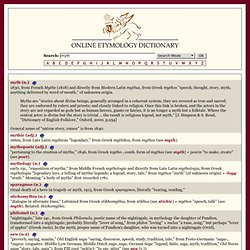
The application in zoology to a tailed amphibian (known natively as an eft or newt) is first recorded 1610s. Aristotle, and especially Pliny, are responsible for the fiction of an animal that thrives in and extinguishes fires. The eft lives in damp logs and secretes a milky substance when threatened, but there is no obvious natural explanation its connection with the myth. Also used 18c. for "a woman who lives chastely in the midst of temptations" (after Addison), and "a soldier who exposes himself to fire in battle. " To rub someone a salamander was a 19c. form of German student drinking toast (einem einen salamander reiben). Online Etymology Dictionary. Online Etymology Dictionary. Old English folc "common people, laity; men; people, nation, tribe; multitude; troop, army," from Proto-Germanic *folkom (cognates: Old Frisian folk, Middle Dutch volc, German Volk "people"), from Proto-Germanic *fulka-, perhaps originally "host of warriors;" compare Old Norse folk "people," also "army, detachment;" and Lithuanian pulkas "crowd," Old Church Slavonic pluku "division of an army," both believed to have been borrowed from Proto-Germanic.
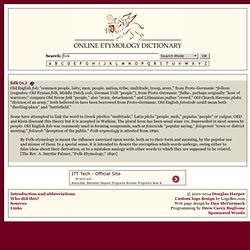
Old English folcstede could mean both "dwelling-place" and "battlefield. " Some have attempted to link the word to Greek plethos "multitude;" Latin plebs "people, mob," populus "people" or vulgus; OED and Klein discount this theory but it is accepted in Watkins. The plural form has been usual since 17c. Superseded in most senses by people. Old English folc was commonly used in forming compounds, such as folccwide "popular saying," folcgemot "town or district meeting;" folcwoh "deception of the public. " Online Etymology Dictionary. Online Etymology Dictionary.
Folklore (n.) 1846, coined by antiquarian William J.
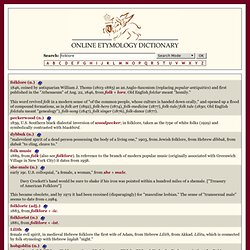
Thoms (1803-1885) as an Anglo-Saxonism (replacing popular antiquities) and first published in the "Athenaeum" of Aug. 22, 1846, from folk + lore. Old English folclar meant "homily. " This word revived folk in a modern sense of "of the common people, whose culture is handed down orally," and opened up a flood of compound formations, as in folk art (1892), folk-hero (1874), folk-medicine (1877), folk-tale/folk tale (1850; Old English folctalu meant "genealogy"), folk-song (1847), folk singer (1876), folk-dance (1877). peckerwood (n.) 1859, U.S. Dybbuk (n.) "malevolent spirit of a dead person possessing the body of a living one," 1903, from Jewish folklore, from Hebrew dibbuk, from dabak "to cling, cleave to. " folk music 1889, from folk (also see folklore). She-male (n.) early 19c. Davy Crockett's hand would be sure to shake if his iron was pointed within a hundred miles of a shemale.